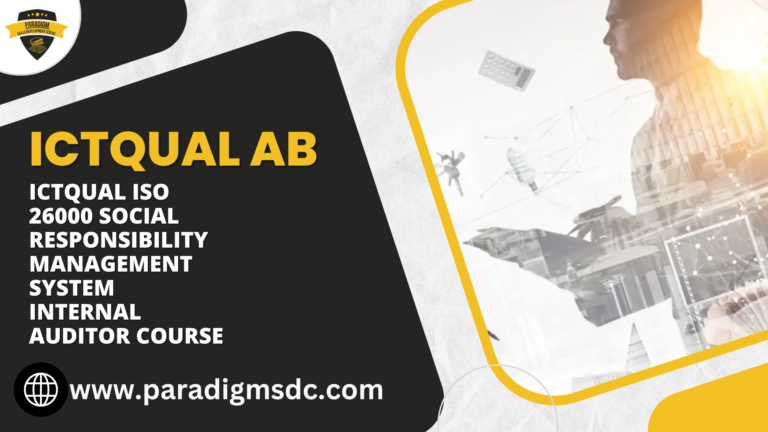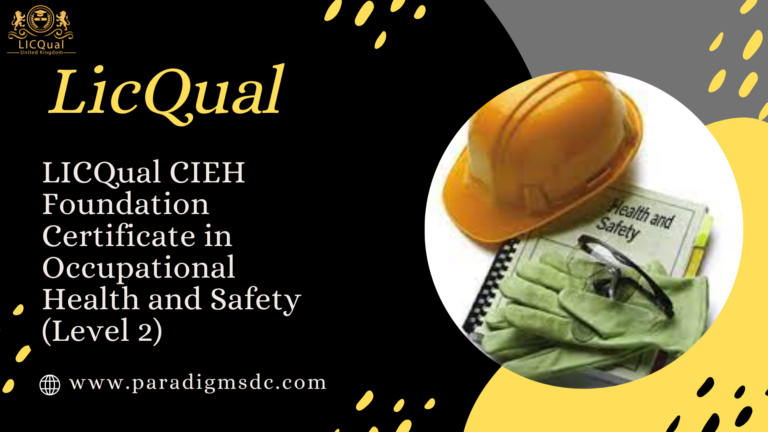Course Introduction
In today’s dynamic business environment, effective risk management is crucial for organizational success. The ICTQual ISO 31000 Risk Management Lead Auditor Course is designed to equip professionals with the knowledge and skills needed to implement and audit risk management processes in line with ISO 31000 standards. This course provides a comprehensive understanding of risk management principles and practices, enabling participants to effectively lead audits and enhance organizational resilience.
Course Overview
The ICTQual ISO 31000 Risk Management Lead Auditor Course covers the essential elements of risk management frameworks and processes. Participants will learn how to establish a risk management culture, conduct risk assessments, and audit risk management systems. The course blends theoretical knowledge with practical applications, ensuring that attendees are well-prepared to lead risk audits and improve their organization’s risk management capabilities.
Course Study Units
The course is structured around the following key study units:
- Introduction to Risk Management:
- ISO 31000 Framework and Principles:
- Risk Assessment Methodologies:
- Risk Treatment and Control:
- Risk Communication and Reporting:
- Audit Principles and Techniques:
- Leading Risk Management Audits:
- Continuous Improvement and Professional Development:
Learning Outcomes
Upon successful completion of the course, participants will be able to:
- Introduction to Risk Management:
- Understand the fundamental principles, concepts, and terminology of risk management.
- Recognize the importance of effective risk management in organizational success and sustainability.
- Explain the role of ISO 31000 as an international standard for risk management.
- Identify key stakeholders involved in the risk management process and their roles.
- ISO 31000 Framework and Principles:
- Describe the structure and components of the ISO 31000 framework.
- Apply the principles and guidelines outlined in ISO 31000 to manage risks effectively.
- Analyze the interrelationships between different elements of the ISO 31000 framework.
- Evaluate the suitability of ISO 31000 for various organizational contexts and industries.
- Risk Assessment Methodologies:
- Explain different risk assessment methodologies, including qualitative, quantitative, and semi-quantitative approaches.
- Apply appropriate risk assessment techniques to identify and prioritize risks.
- Analyze risk factors such as probability, impact, and uncertainty in the context of risk assessment.
- Interpret and communicate the results of risk assessments to stakeholders.
- Risk Treatment and Control:
- Evaluate various risk treatment options, including avoidance, mitigation, transfer, and acceptance.
- Develop risk treatment plans based on the results of risk assessments and organizational objectives.
- Implement controls and measures to manage and mitigate identified risks effectively.
- Monitor and review the effectiveness of risk treatment measures and adjust plans as necessary.
- Risk Communication and Reporting:
- Demonstrate effective communication skills to convey risk information to stakeholders at all levels.
- Prepare clear and concise risk reports, registers, and dashboards for decision-making purposes.
- Utilize appropriate communication channels and formats to reach different audiences.
- Engage stakeholders in discussions about risk implications and potential responses.
- Audit Principles and Techniques:
- Understand the principles, concepts, and terminology of auditing.
- Plan and conduct risk management audits in accordance with established audit standards and procedures.
- Collect and analyze audit evidence to assess compliance with ISO 31000 and organizational policies.
- Document audit findings accurately and report them to relevant stakeholders.
- Leading Risk Management Audits:
- Lead audit teams effectively, providing guidance and support throughout the audit process.
- Apply risk-based audit planning techniques to prioritize audit objectives and resources.
- Demonstrate leadership and communication skills to facilitate productive audit discussions and interactions.
- Ensure audit objectives are achieved efficiently and audit findings are addressed appropriately.
- Continuous Improvement and Professional Development:
- Identify opportunities for ongoing learning and professional development in the field of risk management.
- Stay informed about emerging trends, best practices, and evolving standards in risk management.
- Implement continuous improvement initiatives to enhance risk management processes and practices.
- Engage in professional networks and communities to exchange knowledge and experiences.
Course Benefits
The ICTQual ISO 31000 Risk Management Lead Auditor Course offers several benefits, including:
- Expert Knowledge: Gain insights from experienced instructors with real-world auditing experience.
- Practical Skills: Learn through hands-on activities and case studies to apply concepts in real scenarios.
- Certification: Upon successful completion, participants receive a recognized certification, enhancing their professional credibility.
- Networking Opportunities: Connect with other professionals in the field, sharing experiences and best practices.
Who is this Course For?
This course is ideal for:
- Risk management professionals seeking to enhance their auditing skills.
- Internal auditors looking to expand their knowledge of risk management frameworks.
- Compliance officers and managers responsible for risk oversight.
- Quality managers and consultants interested in integrating risk management into their practices.
- Anyone interested in developing a career in risk management and auditing.
Future Progression
Completing the ICTQual ISO 31000 Risk Management Lead Auditor Course opens up several career advancement opportunities, such as:
- Advanced roles in risk management or auditing.
- Specialized certifications in risk management or related fields.
- Leadership positions within organizations focused on risk governance.
- Opportunities to lead risk management initiatives in various sectors.
By investing in this course, participants not only enhance their skills but also position themselves as valuable assets in their organizations, ready to tackle the complexities of modern risk management.
Conclusion
The ICTQual ISO 31000 Risk Management Lead Auditor Course provides a robust foundation for professionals seeking to excel in risk management and auditing. With its comprehensive curriculum and practical focus, participants will be well-equipped to lead their organizations in managing risks effectively and ensuring compliance with international standards.







